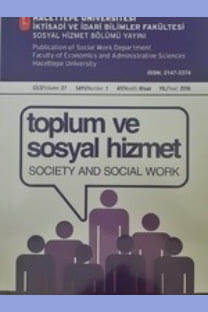ENGELLİ ÇOCUĞU OLAN AİLELERİN YAŞAM DÖNGÜSÜ İÇİNDE KARŞILAŞTIKLARI SORUNLARIN İNCELENMESİ
Bu araştırma engelli çocuğu olan ailelerin yaşam döngüsü içinde karşılaştıkları sorunları saptamak amacı ile planlanıp yürütülmüştür. Araştırmaya engelli çocuğa sahip toplam 71 aile alınmıştır. Veri toplama aracı olarak anket formu kullanılmıştır.Araştırma sonucunda ilkokul ve lise mezunu anneler çocuklarının engelini öğrendikten sonra yaşam tarzlarının değiştiğini ve zorlaştığını belirtirken, ortaokul mezunu anneler sosyal ilişkilerinin bittiğini ifade etmişlerdir. İlkokul ve ortaokul mezunu babalar çocuklarının engelini öğrendikten sonra yaşamlarında bir değişiklik olmadığını ifade ederken, lise ve üniversite mezunu babalar maddi yük ve sorumluluklarının arttığını ifade etmişlerdir. Ancak tüm toplumun engellilik konusunda bilinçlendirilmesi yolu ile engelli çocuklar ve ailelerinin yaşam döngüsü içinde karşılaştıkları sorunlar en aza indirgenebilir.
Anahtar Kelimeler:
Engelli, aile, yaşam döngüsü
Investigating the Problems Confronted by the Families with Disabled Children during Their Life Cycle
This research was conducted to determine the problems that families with disabled children face during their lives. 71 families with disabled children were subjected in the research. A questionnaire was used for data collecting.The research results indicate that, mothers who are elementary and high school graduates have had difficulties and had to change the ways they live, after realizing the disability. Mothers who graduated from middle-school remarked that their social activities had ceased.Fathers who are elementary and middle-school graduates told that after being aware of the disability, no changes had taken place in their lives. Contrarily, fathers with high school and university degrees mentioned that their financial loads had worsened and responsibilities had increased. Despite all the difficulties, problems that families and children go thorough in their lives be minimized by making aware the society in all about the concept of disability.
Keywords:
Disabled handicapped, family, life cycle,
___
- BRISTOL, M; GALLAGHER, J.J; SCHOPLER, E." Mothers and Fathers of Young and Developmentally Disabled and Non-Disabled Boys: Adaptation and Spousal Support”, Developmental Psychology, 24, 1988, 441- 451
- CRNIC, K.A.; RAGZİN, A.S.; GREENBERG, M.T.; ROBINSON, M.N.; BASHAM, R.B.” Social Interaction and Developmental Competence of Preterm and Full Term Infants During the First Year of Life", Child Development, 54, 1983, 1199-1210.
- DYSON, L.L. “Fathers and Mothers of School-Age Children with Developmental Disabilities: Parental Stress, Family Functioning and Social Support”, American Journal on Mental Retardation, Vol: 102, (3), 1997, 267- 279.
- FRIEDRICH, W.N.; FRIEDRICH, W.L. “Psychosocial Assets of Parents of Handicapped and Nonhandicapped Children", American Journal of Mental Deficiency, 85, 1981, 551-553,
- FRIEDRICH, W.N.; WILTURNER, L.T.; COHEN, D.S. “Coping Resources and Parenting Mentally Retarded Children”, American Journal of Mental Deficiency, 9, 1985, 130-139.
- GALLAGHER, J.J.; CROSS, A.; SCHARFMAN, W. “Parental Adaptation to a Young Handicapped Child: The Father’s Ro¬le”, Journal of the Division for Early Childhood, 3, 1981,3-14.
- GATH, A. ‘The Mental Health of Siblings of Congenitally Abnormal Children”, Journal of Child Psychology and Psychiatry, 13, 1972, 211-218.
- GOLDBERG, S; MARCOVITCH, S; MACGREGOR, D; LOJKESEK, M. “Family Responses to Developmentally Delayed Preschoolers: Etiology and the Father’s Role”, American Journal of Mental Deficiency, 90, 1986, 610-617.
- KAZAK, A.E.; MARVİN, R.S. "Differences, Difficulties and Adaptation; Stress and Social Networks in Families with a Handicapped Child”, Family Relations. 33, 1984, 67-77.
- KONSTANTAREAS, M.M.; MOMENTIDIS, S. "Mothers and Fathers’ Self Report of Involvement with Austistic, Mentally Delayed and Normal Children, Journal of Marriage and the Family, 54, . 1992, 153-164.
- METİN, N,; SAN (Bayhan) P. "Zeka Özürlü Çocuğu Olan Annelerin Çocuklarının Özürlü Olduğunu Öğrendikten Sonraki Yaşadıkları Duygu, Düşünce ve Tepkilerinin Eğitim Dü-zeylerine Göre İncelenmesi ", 1. Ulusal Özel Eğitim Kongresi Kitabı, Ş. Bilir (Ed.) 11-12 Kasım, 1992, Ankara, Hacettepe Üniversitesi.
- MILGRAM, N.A.; ATZIL, M.” Parenting Stress in Raising Autİstic Children” Journal of Autism and Developmental Disabilities, 18, 1988, 415-424.
- MINNES, P.M. “Family Resources and Stress Associated with Having a Mentally Retarded Child", American Journal on Mental Retardation, 93, 1988, 184-192.
- PAYNE, S.G.; STONEMAN, Z. “Family Predictors of Maternal and Paternal Involvement in Programs for Young Children with Disabilitİes”, Child Development, 68, 4, 1997, 701-717.
- RODRIGUE, J.R; MORGAN, S.B.; GEFFKEN, G. “A Comparative Evaluation of Adaptive Behavior in Children and Adolescents with Autism, Down Syndrome and Normal Development", Journal of Autism and Developmental Disorders, 21, 1991, 187-196.
- RODRIGUE, J.R.; MORGAN, S.B.; GEFFKEN, G.” Psychosocial Adaptation of Fathers of Children with Autism, Down Syndrome, and Normal Development”, Journal of Autism and Developmental Disorders, 22, 1992,249-263.
- RODRIGUE, J.R.; GEFFKEN, G.; MORGAN, S.B. “Perceived Competence and Behavioral Adjustment of Siblings of Children with Autism”, Journal of Autism and Developmental Disorders, 23, 1994, 665- 674,
- ROUSEY, A.; BEST, S.; BLACHER, J. "Mothers’ and Fathers' Perceptions of Stress and Coping With Children Who Have Severe Disabilities”, American Journal of Mental Retardation, 97, 1992, 99-109.
- SANDERS, J.L.; MORGAN, S.B. “Family Stress and Adjustment as Perceived by Parents of Children with Autism or Down Syndrome: Implications for Intervention", Child and Family Behavior Therapy,19,4, 1997, 15-32.
- SCHILLING, R.F.; GILCHRIST, L.D.; SCHINKE, S.P. “Coping and Social Support in Families of Developmentally Disabled Children", Family Relations, 33, 1984, 47- 54.
- ISSN: 2147-3374
- Yayın Aralığı: Yılda 4 Sayı
- Başlangıç: 2000
- Yayıncı: Hacettepe Üniversitesi İktisadi ve İdari Bilimler Fakültesi
Sayıdaki Diğer Makaleler
ZİHİNSEL ENGELLİ ÇOCUKLAR VE AİLELERİNE HİZMET VEREN MODELLERE GENEL BİR BAKIŞ
ENGELLİ ÇOCUĞU OLAN AİLELERİN YAŞAM DÖNGÜSÜ İÇİNDE KARŞILAŞTIKLARI SORUNLARIN İNCELENMESİ
Necate BAYKOÇ DÖNMEZ, Pınar BAYHAN, İsmihan ARTAN
TÜRKİYE'DE SOSYAL HİZMET EĞİTİMİNDE AKTİF ÖĞRENME
YAŞAM KALİTESİ ÖLÇEĞİNİN PSİKOMETRİK DEĞERLENDİRMESİ
